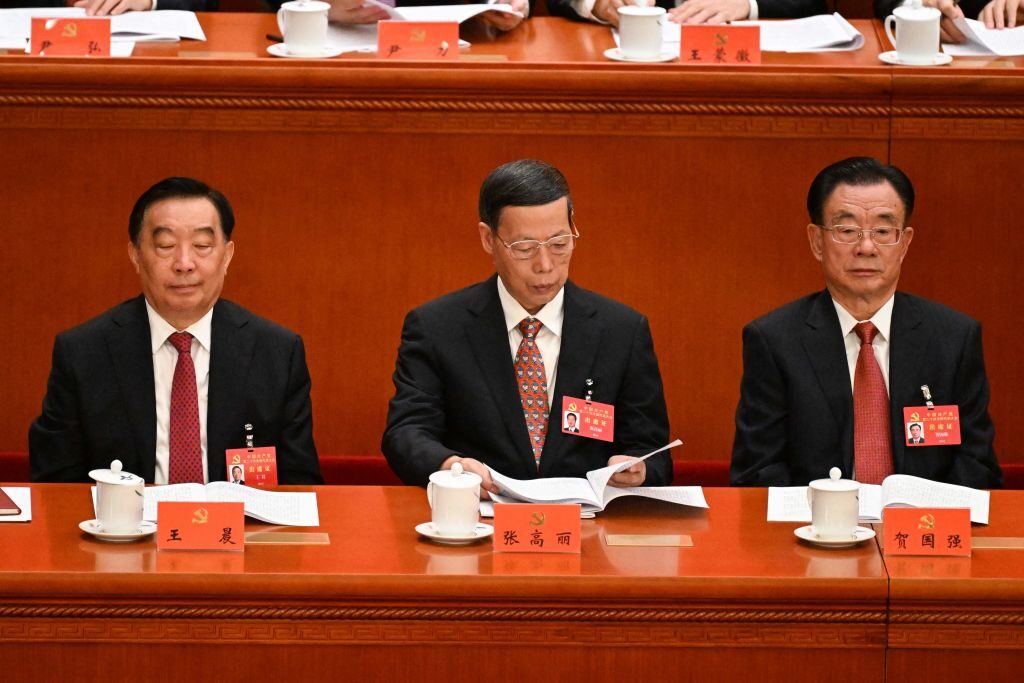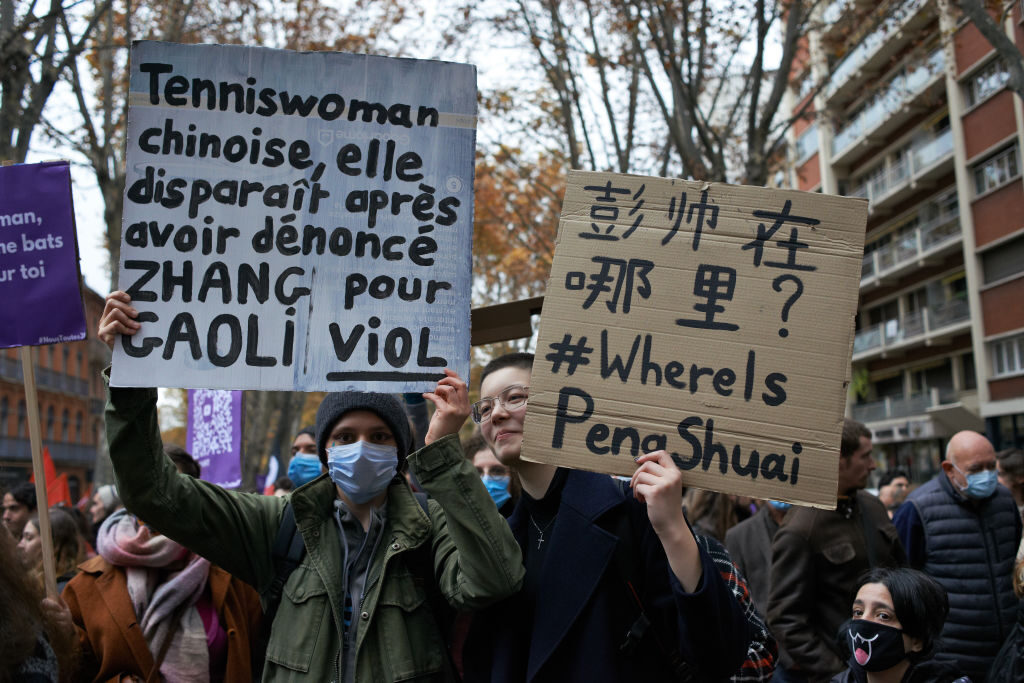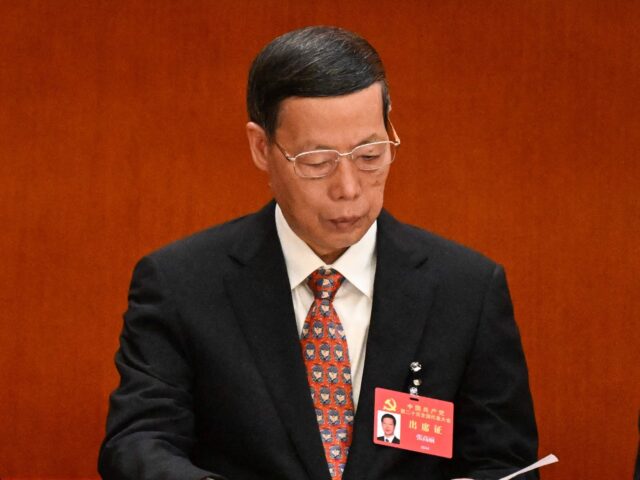Zhang Gaoli, the former head of the Beijing Winter Olympics steering group who missing tennis star Peng Shuai accused of raping her, received a front-row seat and a coveted Party “elder” position at this week’s Chinese Communist Party Congress, his first public appearance since Peng’s public accusations last year.
Zhang, who was also once a former vice premier, sat alongside several other retired communists – among them former President Hu Jintao and other former premiers and high-ranking Politburo members – behind dictator Xi Jinping on Sunday, an eager audience for Xi’s two-hour speech on the supremacy of Chinese communism.
The Communist Party Congress occurs every five years and was once meant to determine the leadership of China’s tyranny, but for the past decade, under Xi, the event has become a personal celebration for the president, commander-in-chief, general secretary, and the rest of Xi’s dozen official titles.

(L to R) Delegates Wang Chen, Zhang Gaoli and He Guoqiang attend the opening session of the 20th Chinese Communist Party’s Congress at the Great Hall of the People in Beijing on October 16, 2022. (NOEL CELIS/AFP via Getty)
Xi used the occasion this year to declare China the world’s most powerful country without addressing a growing wave of anti-communist civil unrest, the economic destruction caused by his insistence on city-wide coronavirus lockdowns, or suspected tensions between China and Russia over the latter’s nearly decade-long invasion of Ukraine.
Instead, Xi threatened to use violence and “all measures necessary” to end Taiwan’s sovereignty and celebrated the destruction of the 2019 anti-communist movement in Hong Kong, crushed by violence, mass arrests, and forcing protest leaders into exile.
Japan’s Nikkei reported that Chinese state media mentioned Zhang Gaoli by name and listed him as a “party elder,” suggesting that he had suffered no demotions or other consequences following the Peng Shuai scandal. He was also positioned alongside other formerly high-ranking retired individuals and not in any way isolated.
Other than confirming his presence, however, Chinese state media outlets such as the Xinhua News Agency did not offer any more information on Zhang’s activities, if any, at the Congress.
Reuters observed that, while many elders did make it to support Xi at the first day of the Congress, former president Jiang Zemin did not. Jiang, the president who ordered the Tiananmen Square massacre, made headlines at the last Party Congress in 2017 by falling asleep, yawning, and otherwise ignoring Xi Jinping’s three-and-a-half-hour speech declaring the end of America at the forefront of the world order. Jiang’s absence has not been taken as necessarily disapproval of Xi, however, as the former head of state is 96 years old and rumored to be in poor health.
Zhang Gaoli’s presence at the front row of the Congress on Sunday appears to indicate that Beijing does not consider the Peng Shuai scandal to be a threat to its financial or diplomatic clout any longer. When Peng wrote her post on the heavily censored Chinese social media outlet Weibo accusing Zhang of rape, then disappeared from the public eye, the Women’s Tennis Association (WTA) announced that it would suspend tournaments in China until further notice. While applauded as a moral stance, in late 2021, the possibility of holding any public events in China was still tenuous at best, given Xi’s insistence of locking down millions of people without warning to allegedly prevent the spread of Chinese coronavirus. The WTA has already confirmed that it will return to doing business with the Chinese Communist Party in 2023.
Peng published her Weibo post in November 2021, identifying Zhang Gaoli by name and claiming that he invested months, despite being married, into coercing her into a sexual relationship.
“I used to bury everything inside me. After all, if you didn’t want to take any responsibility, why did you come back for me, and brought me to your home to have sex?” Peng wrote. “It is true that I don’t have evidence. It is also not possible to leave evidence.”

File/Two people hold placards for the Chinese tennis woman Peng Shuai who disappeared after accusing Zhang Gaoli of sexual violences. Women from the collective NousToutes organized a protest Toulouse against sexual violence and patriarchy. (Alain Pitton/NurPhoto via Getty Images)
Her extensive post also described suicidal feelings and claimed the relationship ultimately became consensual. It lasted less than an hour on Weibo before censors took it down, but users reproduced and translated the text to ensure it would not disappear.
Peng disappeared from the public for weeks following the publication of the story, then resurfaced in dubious photos in the Chinese government newspaper Global Times appearing to enjoy an outing at a restaurant. Former Global Times editor-in-chief Hu Xijin lost his job shortly after the restaurant “reporting” failed to silence global outrage and demands for proof that Peng was safe.
Peng ultimately reappeared at the 2022 Beijing Winter Olympics, offering a highly regulated interview to the French magazine L’Equipe under the watchful eye of Communist Party handlers. The magazine claimed that Peng denied ever accusing anyone of rape and insisted, “I never disappeared.”
“I never said anyone sexually assaulted me,” L’Equipe quoted Peng as saying while monitored by Chinese government officers.
Peng has largely disappeared from the public eye again after the Olympics concluded, despite being one of China’s most successful and prominent tennis stars and a Wimbledon doubles champion. Her silence has led to continued protests demanding her freedom. During last year’s Wimbledon – in which players of Russian or Belarusian nationality were banned, even those who openly opposed the Russian invasion of Ukraine – organizers silenced multiple attempts to protest in Peng Shuai’s name. On one occaison, security officials prevented spectators from wearing shirts asking what had happened to Peng.
During the men’s singles finals, security officials violently assaulted activist Drew Pavlou for silently holding a sign reading “Where is Peng Shuai?”, shoving him down a flight of stairs. Wimbledon officials later denied the shove, despite the fact that it had been documented in the live broadcast of the match.
Follow Frances Martel on Facebook and Twitter.

COMMENTS
Please let us know if you're having issues with commenting.